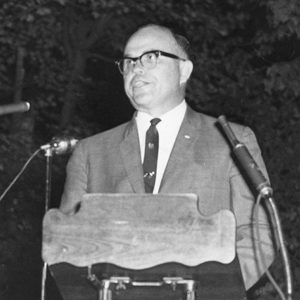calsfoundation@cals.org
Hubert Ethridge (H. E.) Williams (1913–1998)
Hubert Etheridge Williams was a twentieth-century religious, educational, and civic leader. He founded what is now Williams Baptist University and made an unsuccessful race for the Democratic nomination for governor in 1960. In 1941, he became the youngest college president in the nation.
Hubert Etheridge (H. E.) Williams was born on April 8, 1913, in Casa (Perry County) to Robert L. Williams and Anna Emma Williams. Robert Williams, who was a Baptist deacon, had progressive leanings, which he instilled in his son. Williams graduated from Casa High School and enrolled at Arkansas Polytechnic College—which later became Arkansas Tech University—in Russellville (Pope County). He also attended Ouachita Baptist College—which later became Ouachita Baptist University—in Arkadelphia (Clark County), and the George Peabody College for Teachers in Nashville, Tennessee (now part of Vanderbilt University).
In the mid-1930s, as pastor of First Baptist Church in Harrisburg (Poinsett County), Williams learned of the failed efforts to revive Jonesboro Baptist College, a school that had been part of a larger Baptist effort to provide education in the state and had been a casualty of the Great Depression. Williams began pastoring First Baptist Church of Pocahontas (Randolph County) in 1941 and continued until 1943. With the support of alumni from Jonesboro Baptist College as well as past students from the Maynard Baptist Academy, Williams sought to found a new Baptist school in the region.
Williams believed that such a college would be an effective evangelical tool in the region. While some supporters wanted to found the new college in Jonesboro (Craighead County), others sought a fresh start due to the previous failures of similar institutions in the city. Still others argued that a small Christian school should not be built to compete with the larger state college—what is now Arkansas State University—in Jonesboro.
Williams, however, sought to found the school in his community of Pocahontas. Williams, in his short tenure at First Baptist, had become something of a civic leader. He chaired the Pocahontas Chamber of Commerce and maintained friendships with diverse collection of local businessmen and political leaders. Pocahontas was the home of St. Paul’s Catholic Church as well as a parochial school, but Williams, unlike many Arkansas Baptists, rejected anti-Catholic rhetoric. He counted local Catholic businessmen and political leaders, such as Ambrose J. Baltz Sr. and George Promberger, among his friends. He even accepted financial support from some members of the Catholic community, which was critical to opening the doors of the college.
On September 10, 1941, the new Southern Baptist College (SBC) opened in Pocahontas in a building rented from the city. Twenty-eight-year-old Williams became the first president of Southern after his first choice rebuffed his offer. Williams remained in the pulpit at First Baptist until 1943, when he resigned to devote his full attention to the young college. Williams and his family even lived at the college for a time. After the building in Pocahontas burned, SBC moved to the former air base near Walnut Ridge (Lawrence County). In 1949, the Arkansas Baptist State Convention agreed to provide SBC with limited financial support in exchange for nine non-voting seats on the board of trustees.
In 1958, Williams was part of an American delegation that traveled to Russia to gather information about the consequences of communism. He again traveled to Russia in 1959.
In 1960, Williams entered the Democratic Party primary for governor of Arkansas. The candidates included Williams, incumbent governor Orval Faubus, Attorney General Bruce Bennett, a planter from Grady (Lincoln County) named Joseph C. Hardin, and Hal Millsap. Williams kicked off his campaign on the lawn of the Lawrence County Courthouse in Walnut Ridge before a crowd of nearly 2,000. By this time, he had been president of the college for nineteen years and had served as president of two radio stations, one in Walnut Ridge and one in Milan, Tennessee. During the campaign, Williams canvassed the state and coined the term “Faubusism,” saying it was “one of the political pimples of history erupting political demagoguery…as a result of the cheap opportunism of a small politician.” He argued that a fourth term for Faubus would be a “political terror” that would give him an “unbreakable” hold on political power in the state. Though Williams offered a spirited campaign, Faubus won the primary and went on to win a fourth term in office.
Williams remained the president of SBC. In 1966, he was appointed to the National Committee on Race Problems by President Lyndon B. Johnson. In 1968, SBC was adopted as an institution of the Arkansas Baptist State Convention, which continues to own and operate the university. Williams served as president of Southern Baptist College until retiring in 1973. Williams then served as president emeritus of the college and continued to be a fixture on campus. In the 1980s, the college became a four-year institution and began offering baccalaureate degrees. In 1989, the name of the college was changed to Williams Baptist College in honor of Williams.
Williams died on February 23, 1998, at St. Bernards Medical Center in Jonesboro. In 2017, it was announced that the college would begin transitioning to become Williams Baptist University.
For additional information:
H. E. Williams Political Campaign. Williams Baptist College Special Digital Collections. Felix Goodson Library. http://cdm16952.contentdm.oclc.org/cdm/landingpage/collection/p16952coll2 (accessed February 17, 2018.)
Reed, Roy. Faubus: The Life and Times of An American Prodigal. Fayetteville: University of Arkansas Press, 1997.
Startup, Kenneth M. The Splendid Work: The Origins and Development of Williams Baptist College. Walnut Ridge: Williams Baptist College, 1991.
Williams, C. Fred, S. Ray Granade, and Kenneth M. Startup. A System & Plan: Arkansas Baptist State Convention, 1848–1998. Franklin: Providence House Publishers, 1998.
Rodney W. Harris
Williams Baptist University
 H. E. Williams
H. E. Williams 




Comments
No comments on this entry yet.